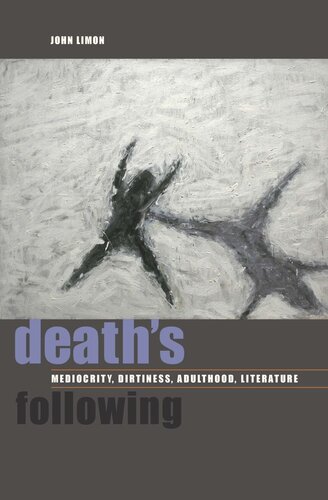

Most ebook files are in PDF format, so you can easily read them using various software such as Foxit Reader or directly on the Google Chrome browser.
Some ebook files are released by publishers in other formats such as .awz, .mobi, .epub, .fb2, etc. You may need to install specific software to read these formats on mobile/PC, such as Calibre.
Please read the tutorial at this link: https://ebookbell.com/faq
We offer FREE conversion to the popular formats you request; however, this may take some time. Therefore, right after payment, please email us, and we will try to provide the service as quickly as possible.
For some exceptional file formats or broken links (if any), please refrain from opening any disputes. Instead, email us first, and we will try to assist within a maximum of 6 hours.
EbookBell Team

4.8
34 reviewsAlmost all twentieth-century philosophy stresses the immanence of death in human life—as drive (Freud), as the context of Being (Heidegger), as the essence of our defining ethics (Levinas), or as language (de Man, Blanchot). In Death’s Following, John Limon makes use of literary analysis (of Sebald, Bernhard, and Stoppard), cultural analysis, and autobiography to argue that death is best conceived as always transcendentally beyond ourselves, neither immanent nor imminent. Adapting Kierkegaard’s variations on the theme of Abraham’s near-sacrifice of Isaac while refocusing the emphasis onto Isaac, Limon argues that death should be imagined as if hiding at the end of an inexplicable journey to Moriah. The point is not to evade or ignore death but to conceive it more truly, repulsively, and pervasively in its camouflage: for example, in jokes, in logical puzzles, in bowdlerized folk songs. The first of Limon’s two key concepts is adulthood: the prolonged anti-ritual for experiencing the full distance on the look of death. His second is dirtiness, as theorized in a Jewish joke, a logical exemplum, and T. S. Eliot’s “Ash Wednesday”: In each case, unseen dirt on foreheads suggests the invisibility of inferred death. Not recognizing death immediately or admitting its immanence and imminence is for Heidegger the defining characteristic of the “they,” humanity in its inauthentic social escapism. But Limon vouches throughout for the mediocrity of the “they” in its dirty and ludicrous adulthood. Mediocrity is the privileged position for previewing death, in Limon’s opinion: practice for being forgotten. In refusing the call of twentieth-century philosophy to face death courageously, Limon urges the ethical and aesthetic value of mediocre anti-heroism.